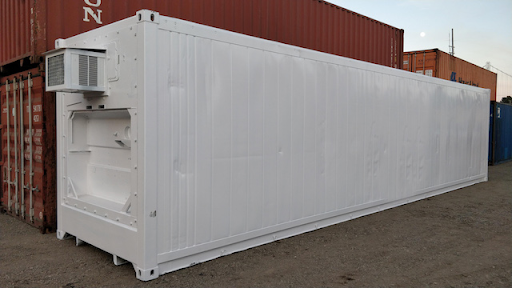Refrigerated vs Insulated Shipping Containers: What is the Difference?
Get a quoteRefrigerated vs Insulated Containers – Key Differences Explained
Key Takeaways
- Refrigerated containers have built-in refrigeration units to maintain a specific temperature range.
- Insulated containers are designed to maintain internal temperature without active cooling.
- Refrigerated containers are often used for perishable goods like food and pharmaceuticals, while insulated containers are used for temperature-sensitive electronics and furniture.
- Refrigerated containers generally cost more due to their cooling systems and higher maintenance needs.
- Conexwest is a trusted shipping container provider offering a variety of reefers and insulated containers for rent or purchase.
What is a Refrigerated Shipping Container
A refrigerated shipping container, commonly referred to as a "reefer," is a specialized intermodal container designed to transport temperature-sensitive cargo over long distances.
These containers are equipped with an integral refrigeration unit that maintains a regulated temperature essential for shipping perishable goods such as fruits, vegetables, meat, seafood, and pharmaceuticals. Its key features include:
- Temperature Control: Capacity to set and maintain specific temperatures.
- Insulation: High-quality insulation to prevent heat transfer.
- Ventilation: Proper airflow for even cooling.
- Durability: Built to withstand harsh conditions and frequent handling.
Conexwest, a leader in shipping and storage solutions based in Northern California, offers new, used, and refurbished containers from 10ft to 45ft, with fast delivery within 3-7 days and container fabrication options like adding shelves and locks. We serve over 10,000 national customers, including prestigious clients like the U.S. Navy and Google. As an ISO 9001 and AWS-certified company, we ensure top quality and competitive pricing. |
Overview of Insulated Shipping Containers

Insulated shipping containers do not require a power supply to maintain temperature
Insulated shipping containers, also known as non-operational refrigerated containers, are designed to maintain a stable internal temperature without the use of active cooling systems. These containers are suitable for goods that need protection from temperature fluctuations but do not require cooling. Its key features include:
- Insulation: High-quality insulation materials to prevent heat transfer.
- Durability: Built to withstand harsh conditions and frequent handling.
- Weatherproof: Designed to protect goods from the elements.
- Cost-Effective: Lower cost compared to refrigerated containers.
Key Differences Between Refrigerated and Insulated Shipping Containers
Temperature Control
- Reefers: These containers are equipped with an active refrigeration system that requires a power source to maintain a temperature range. They can keep perishable goods in a constant cold state throughout the entire shipping process.
- Insulated Shipping Containers: In contrast, insulated containers do not have an active cooling system; instead, they rely on superior thermal insulation to maintain the initial temperature of the contents for a limited time. They are effective at reducing the impact of external temperature changes but do not actively cool the cargo.
Construction and Design
- Reefers: These containers are constructed with built-in refrigeration units and can operate like large refrigerators. They have a more complex design to accommodate the refrigeration system and are often heavier due to the additional equipment.
- Insulated Containers: These containers have a double-wall construction filled with insulation material (like polyurethane foam) to minimize heat transfer. They are often lighter and simpler in design compared to reefers.
Applications
- Reefers: Ideal for long-distance transport of temperature-sensitive goods that require a constant cold chain. They are commonly used in the food and pharmaceutical industries where maintaining a specific temperature is critical throughout the shipping process.
- Insulated Containers: Best suited for shorter journeys or for goods that can tolerate slight temperature variations. They are often used for items like dry goods, feed, or even furniture, where maintaining a stable but not necessarily cold environment is sufficient.
Comparison at a Glance
Feature | Refrigerated Shipping Containers | Insulated Shipping Containers |
Temperature Control | Active refrigeration system to maintain a specific temperature range | Passive insulation to reduce temperature fluctuations |
Power Source | Requires external power source (electrical or diesel generator) | No active cooling system; relies on insulation |
Construction | Built-in refrigeration unit, more complex design, and often heavier | Double-wall construction with insulation material, simpler design, and lighter-weight |
Applications | Long-distance transport of perishable goods requiring strict temperature control | Shorter journeys or goods tolerant of slight temperature variations |
Suitability | Ideal for maintaining a constant cold chain throughout the shipping process | Suitable for protecting cargo from external temperature changes without requiring continuous refrigeration |
Use Cases for Refrigerated Shipping Containers

Refrigerated containers are used for preserving the quality of perishable items
- Food and Beverage Industry: Used by restaurants, catering companies, and food distributors to transport and store perishable items such as fruits, vegetables, dairy products, and meats so they stay fresh and safe for consumption.
- Pharmaceutical Industry: Essential for transporting and storing drugs and vaccines that require controlled environments to maintain their efficacy.
- Agriculture Industry: Farmers and agricultural companies often rent refrigerated containers for temporary storage during harvest seasons.
- Chemical Industry: Used to store and transport temperature-sensitive chemicals and materials to prevent degradation or contamination.
- Events and Festivals: Used at events like music festivals and weddings to store food, beverages, and perishable items such as cakes and flowers so they remain fresh for attendees.
- Disaster Relief Efforts: Used in disaster scenarios to store and transport food, medicines, and other essential supplies while preserving their quality.
- Global Trade: Allows businesses to reach new markets by transporting perishable goods internationally and reducing food waste.
Use Cases for Insulated Shipping Containers
- Transporting Non-Perishable Food Items: Suitable for items that require protection from extreme temperatures but do not need active refrigeration, such as canned goods or dried fruits.
- Shipping Pharmaceuticals: Used for temperature-sensitive medications that need stable conditions but do not require continuous cooling to maintain their efficacy during transport.
- Storing Sensitive Electronics: Provides a controlled environment to protect electronics from heat damage and humidity during shipping.
- Transporting Chemicals: Suitable for shipping heat-sensitive chemicals that require stable temperatures to prevent degradation or reactions.
- Shipping Artwork and Antiques: Protects valuable items from temperature fluctuations and moisture, which can cause damage during transport.
- Event Logistics: Used for transporting items like cakes, flowers, and other temperature-sensitive goods to events so they remain fresh without the need for refrigeration.
- Temporary Storage Solutions: Can be used for on-site storage of goods that need protection from weather conditions, such as construction materials or seasonal products.
- Transporting Wine and Spirits: Maintains a stable environment for wine and spirits during transport to protect them from temperature extremes that could affect flavor and quality.
Get Shipping Containers From Conexwest Today
At Conexwest, we provide high-quality shipping containers for rent or purchase at a favorable rate. From exploring our vast selection of shipping containers to coordinating customizations with our skilled fabrication team to scheduling a container delivery, we guarantee a seamless process to fulfill your storage needs.
Container Range
Our product range includes containers from 10ft to 45ft in length and we cater to both residential and commercial clients. No matter if you are looking for a basic storage container or a fully customized unit with added features like shelving, insulation, or HVAC, we are capable of meeting your specifications.
Customer Support
Our reputation is built on our exceptional customer service and attention to detail, with our dedicated team being always ready to assist you with any inquiries or support you may need such as choosing the right container for your needs or complying with local regulations.
Easy Delivery Process
Our dispatcher will call the site contact 24 hours in advance to confirm the 2-hour delivery window. On the day of delivery, the truck driver will be calling the site contact with a 30-minute delivery window. Upon arrival, our professional team will handle all the setup so you can start using your container.
Have questions about our services? Then click on the below link to get a quote.
Frequently Asked Questions (FAQs)
- How long can refrigerated containers maintain temperature?
Refrigerated containers can maintain their internal temperature for as long as they have a power source. Typically, these containers are connected to an external power source, such as a generator or the ship's power system, to keep the refrigeration unit running.
In the event of a power failure, the insulation will help maintain the temperature for a limited time, but it is important to restore power as soon as possible to prevent spoilage.
- Are insulated containers weatherproof?
Yes, insulated containers are designed to be weatherproof. They are built to withstand harsh conditions and protect the contents from rain, snow, and extreme temperatures. The high-quality insulation materials used in the construction of these containers also help maintain a stable internal temperature.
- What are the main industries using each type?
Refrigerated containers are primarily used in industries that require specific temperature control, such as food and beverages, pharmaceuticals, and event planning.
Insulated containers, on the other hand, are used in industries that need temperature stability without active cooling, such as electronics and furniture.
- How Do I Maintain Refrigerated Containers?
Maintaining refrigerated containers involves regular checks and servicing of the refrigeration unit and includes inspecting coolant levels, checking for leaks, and ensuring the insulation remains intact. It is also essential to clean the container regularly to prevent the buildup of mold and bacteria.
For insulated containers, the maintenance requirements are lower - regular inspections to check if the insulation is intact and the container is weatherproof are generally sufficient. Cleaning the container periodically will also help maintain its condition.
- Are Conexwest’s containers weatherproof and secure?
Yes, all our containers are designed to be durable, secure, and weatherproof so that stored items are protected from weather and theft.
Our team is here to provide you with the best storage solutions available - either for rental or sale. Contact us today at (855) 878-5233 or email quote@conexwest.com for more information or to get a competitive quote.
